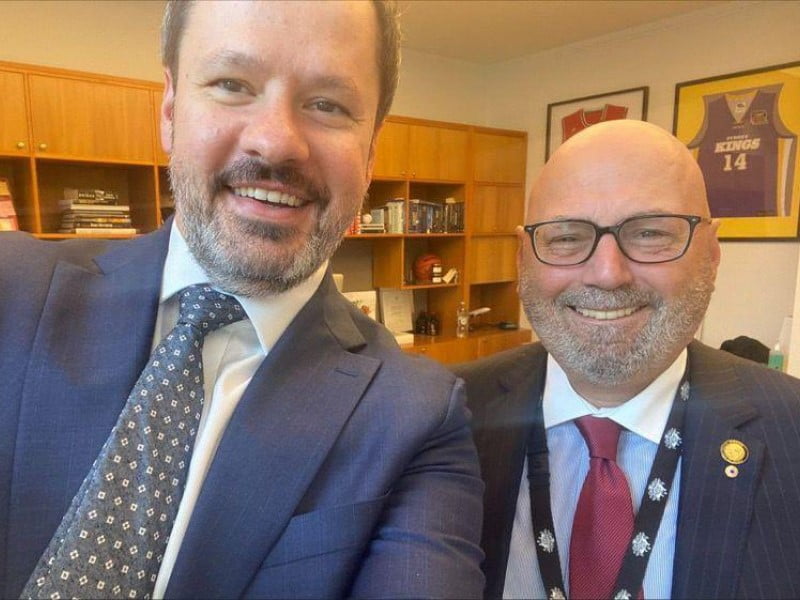The Biden administration’s efforts to support renewables through the landmark Inflation Reduction Act presents a significant critical minerals processing and export opportunity for Australia, according to Arthur Sinodinos, Australia’s Ambassador to the United States.
Legislated in August, the Inflation Reduction Act (IRA) introduced and expanded several tax credits to accelerate the transition to clean energy technologies, including an estimated US$369 billion for ‘energy security and climate change’ activities.
It followed a 2021 report on ‘America’s Supply Chains‘, commissioned by executive order, that found the country was over-reliant on processed critical mineral imports, particularly from China and “adversarial nations”, according to the White House.
In an interview with InnovationAus.com, Mr Sinodinos said the increased demand presents a huge export opportunity for Australia, particularly for minerals the US lacks commercially viable reserves.
Australia is currently the world’s largest producer of aluminium, lithium, and zirconium ores, which are on the US federal government’s list of 50 critical minerals.
It also has the world’s largest reserves of nickel and the second largest reserves of cobalt, both also listed as critical.
“I think there is an opportunity for Australia to play a role in the supply chain. Now, how far along you go in the supply chain depends on where we have a competitive advantage,” Mr Sinodinos told InnovationAus.com.
“There’s a lot of complementarity between the two economies, so I don’t think it’s a zero sum game. We shouldn’t see the IRA as just something that seeks to concentrate critical minerals activity in the US.”
He noted that “leading major companies, [such as] the GMs, Fords, the Teslas” have already reached out to critical minerals firms in Australia and around the world to procure critical minerals and develop processing capabilities to support the production of electric vehicles, batteries, and magnets.

However, to what extent Australia will develop domestic critical minerals processing will be left to the market, he said.
Mr Sinodinos highlighted the $15 billion National Reconstruction Fund and the critical minerals strategy as examples of initiatives to help “stand up” critical minerals processing in Australia to allow it to participate in the supply chain for US green industry development.
“I’m actually quite optimistic about standing up a viable critical minerals [processing] industry, we’ve got all the components we need, the government is willing to back it, and put resources into it, so I think we can do a really good job with it.”
He also acknowledged that there is a “premium in strategic terms for developing these industries domestically”. When asked if this might involve adding a rare earths component to AUKUS, Mr Sinodinos said that Australia’s critical minerals industry development is currently a bilateral effort.
Australian critical mineral exports are overwhelmingly destined for China. For example, in each month of 2021, 85 per cent of the value of total Australian lithium exports went to China, and 94 per cent in each month to August 2022.
This is largely because more than 60 per cent of the world’s lithium processing and refining capacity is based in China. China is also world’s largest producer of more than half of the minerals listed as critical by the US.
Mr Sinodinos recently completed a three-week trip across Australia, partly dedicated to canvassing the opportunities of the IRA. He noted that the Act “came up a fair bit, including when [he] was in the Northern Territory and Western Australia”.
Mr Sinodinos’ meetings with Australian state government trade agencies were centered on how his office and Austrade can best support their interests in the US.
Discussion of the IRA’s implications for Australia also arose in an address to the “Net-Zero Steering Committee of Cabinet”, who he also discussed the implications of the IRA with.
Overall, Mr Sinodinos said “the main message of the trip was, there are green opportunities in the US, we can learn a lot from the way the US does thing in areas like innovation, particularly as we now seek to exploit the opportunities coming out of initiatives like AUKUS, for example, or the Quad.”
Mr Sinodinos said he has also hosted several critical minerals roundtables in the United States and intends to host more to help “accelerate this process of us working together”.
The two countries are currently working to formalise bilateral collaboration on climate change, in addition to the existing economic and security channels.
The federal ministers that Mr Sinodinos met during his trip were Industry and Science minister Ed Husic, Trade minister Don Farrell, Defence minister Richard Marles, Foreign minister Penny Wong, and Prime Minister Anthony Albanese.
Industry and science minister Ed Husic is expected to table legislation for the National Reconstruction Fund in the House of Representatives next week, which will include the $1 billion Value-Adding in Resources Fund.
In its October budget, the Albanese government also re-committed to the Coalition’s promise to establish a $50 million Australian Critical Minerals Research and Development Hub.
A resources technology and critical minerals research commercialisation hub has also been set up under the Coalition’s University Trailblazers program.
The Ambassador is expected to conclude his term in early 2023.
Do you know more? Contact James Riley via Email.

